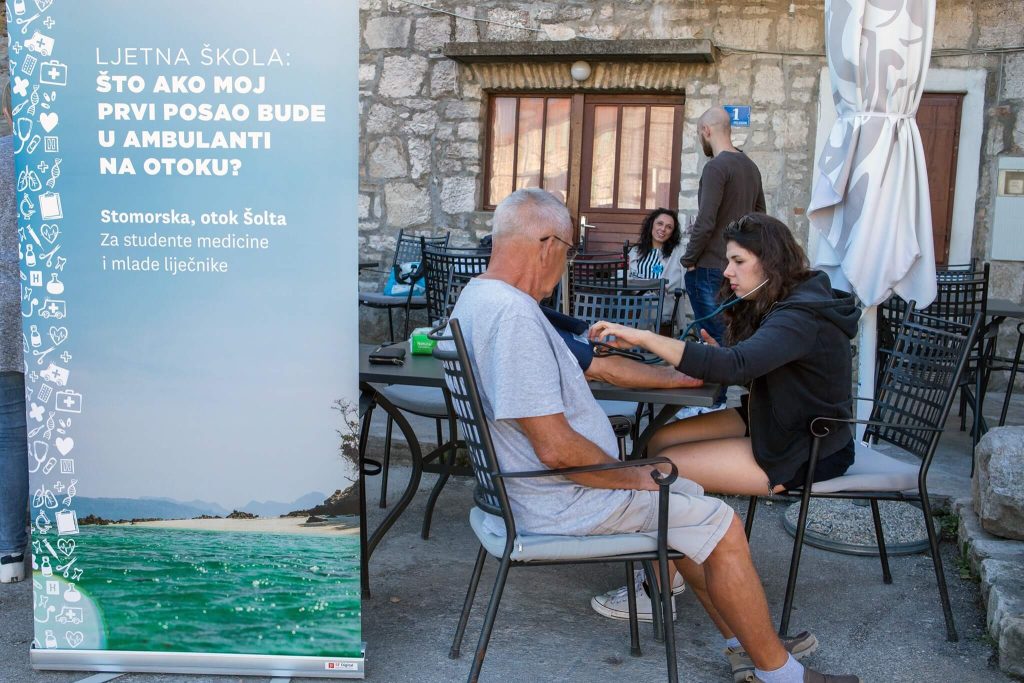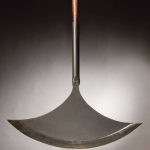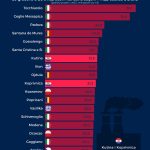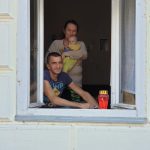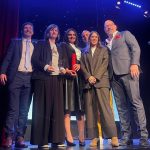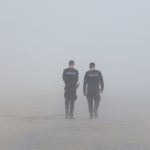If you are someone who grew up in a city, it is likely that the word ”island” to you represents a picture of an everlasting summer. Salty air, gentle breeze, the sound of crashing waves. Peace and quiet. Who could want anything more?
For all their business during the summer, Croatian islands are experiencing depopulation. As much as people enjoy spending their holiday there, few would decide to extend their stay to all 365 days of the year.
All the things that attract tourists – the remoteness, the fact that there is no rush and no traffic, also mean the absence of many advantages of our modern-day life, one of them being the availability of state-of-the-art medical services. The thought puts off both ”regular” people as well as budding medical professionals.
In order to change that, Tina Dušek, a professor at the Medical School of the University of Zagreb and an internal medicine specialist, with the support of the Croatian Society for Endocrinology and Diabetology organized the first Island Medicine Summer School (Croatian: Ljetna škola otočne medicine) in Stomorska on the island of Šolta, intended for medical students in their final years of study and newly-graduated doctors.
This September will see its third edition of Island Medicine Summer School, with the one last year being postponed due to the pandemic.
Why a school of ”island medicine”?
As explained on their page, ”the island symbolizes a geographically isolated area whose population has difficulty accessing larger health facilities. Such conditions – whether truly on an island or in a remote continental town – require the comprehensive training of a doctor, who must be an internist, a surgeon, an obstetrician, a radiologist, a psychiatrist, and more. In the absence of sophisticated diagnostic and therapeutic methods, the most valuable medical tool is the knowledge and experience, which we want to pass onto you”.
Island Medicine Summer School has two goals. One, to help young doctors gain authentic life and professional experience, and to increase their interest in professional engagement in geographically isolated environments, and the other, to contribute to the quality of life and health care in other geographically isolated areas.
In short, the Summer School prepares its participants to diagnose and treat patients in places without sophisticated diagnostic and therapeutic methods available.
”Bring medicine back to a human level”
As professor Tina Dušek explains, ”21st-century medicine strongly relies on arranging a dozen different tests and diagnostic procedures, a patient gets a referral for this and a referral for that. In the end, it results in moving away from person-centered care.
Our motivation was to think about medicine in ”island conditions”, that is, in absence of sophisticated diagnostic and therapeutic methods, the way it looked a hundred years ago, when a doctor or a medicine man, if you will, a healer, had nothing but his hands, his knowledge, experience, and his emotion to work with.
That is the idea of our Island Medicine Summer School – to bring medicine back to a human and humane level, where a relationship between a patient and a doctor is in the foreground and a starting point for everything else.”
One thing that professor Dušek has emphasized again and again throughout our conversation was the importance of human touch and empathy. It is easy to learn to do X if Y, to follow the steps you have been taught as a student. Prescribe this, refer to that specialist, make an appointment for a procedure – everyone can do that. However, there is more to a good doctor than issuing a correct diagnosis.
The right approach is everything, according to professor Dušek. Empathy, emotional intelligence, the patience to stop and truly listen to what people are saying – that is what makes a great doctor.
”Small communities are excellent ground for making a lasting impact”
”On the one hand, we still have people who approach medical professionals with reverence and unease. On the other, young doctors are often still building their confidence and can also feel unsure on the best way to speak to a patient. That is why I think that getting a position in a rural area, a small town, on an island, is a great path to self-developing both as an individual and as a doctor. Small communities are perfect for those with the desire and ambition to make an impact, come up with a project that will add to society in some way. When you work as an island doctor, you get to know your patients, you develop a connection.
Sometimes, they will come not because they need medical assistance, but because they need someone to talk to. Doctors working in rural areas will have an easier time to stand out and to bring about a positive change, much more effectively than they would in a complex system such as a clinical center in a big city.”
”An overwhelming response already producing results”
I ask if they have already heard from former participants of past Summer Schools. Is the changing perception of working in rural areas already noticeable?
”Yes, it is. Off the top of my head, there is one colleague who accepted a job on Murter and another who works in Sisak-Moslavina County. During our first year, in 2018. we received 300 applications. We try to choose candidates who have already shown interest in volunteering and working in the community. Grades are not the deciding factor here. As students are accepted based on a motivation letter, we also try to take into consideration that not everyone has a way with words. We try to give a chance to a diverse set of candidates.
”Participants work in small groups intensively with instructors, solving professional tasks in a “problem based” form and practicing manual skills. The local community has welcomed our initiative, as we organize free blood pressure and blood sugar measurement.”
For more stories about great initiatives such as this one, CLICK HERE.

